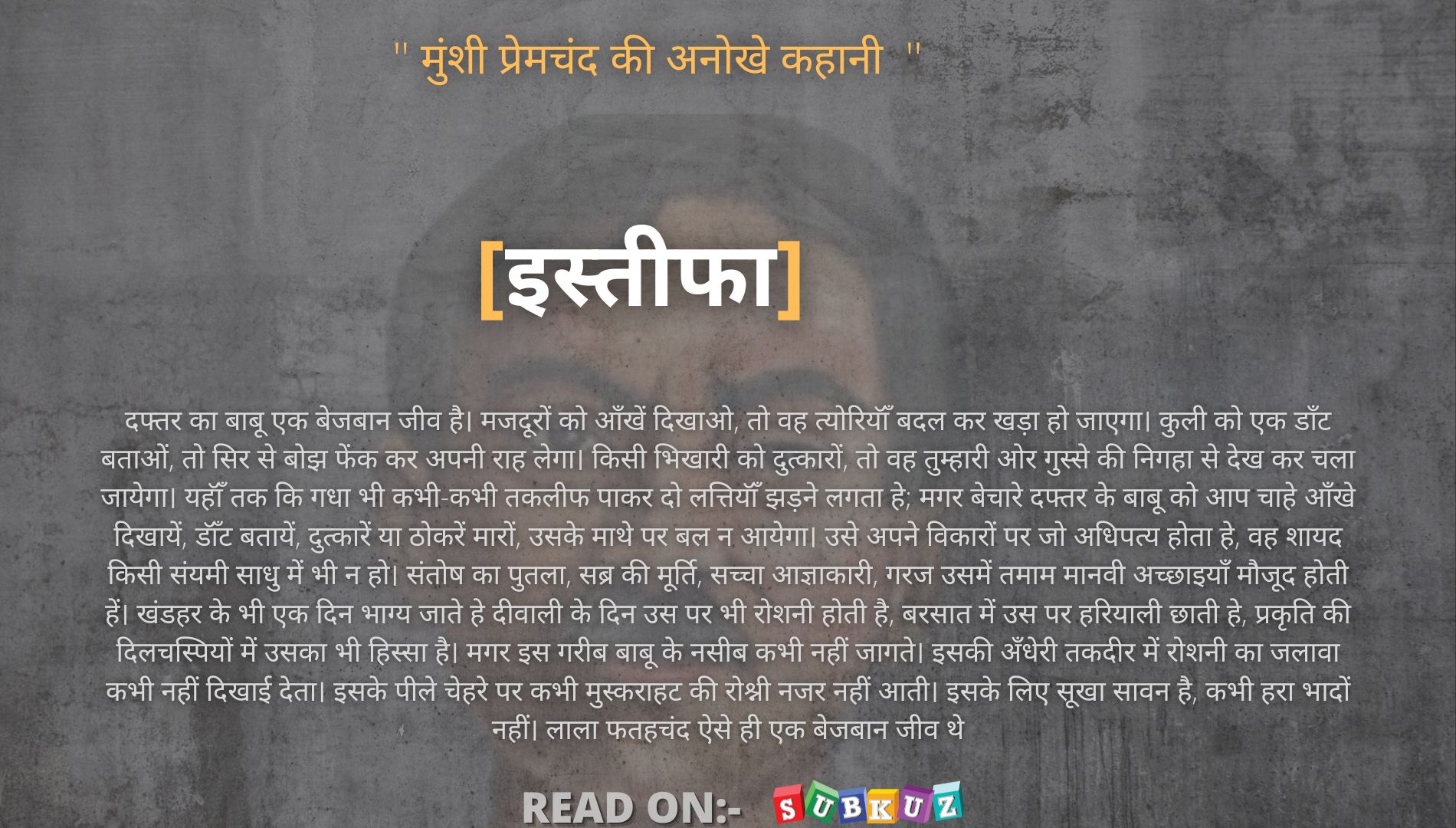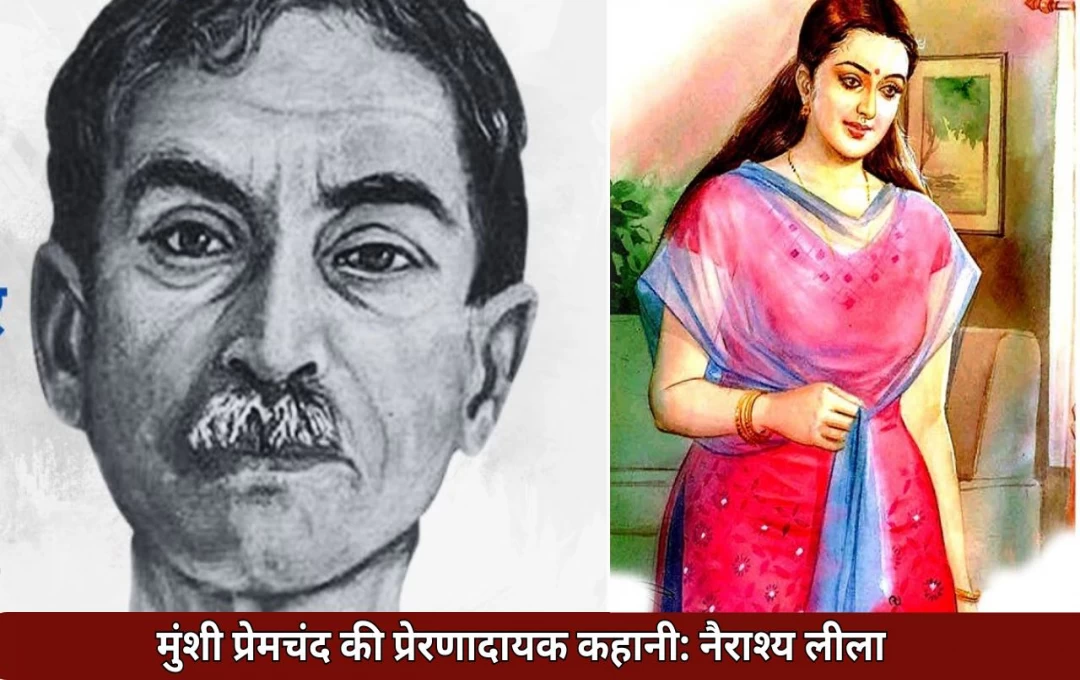Friends, our nation has, for centuries, been a birthplace and a stage for great personalities, brimming with qualities like sages, poets, writers, and musicians, among others. The countless works created by these great souls are invaluable treasures.
Today's youth, in this digital age, seem to be lost somewhere, and we are drifting further away from our heritage and invaluable treasures. subkuz.com strives to bring you not only these precious treasures but also entertaining stories, news, and information about the world.
Presented before you here is a timeless tale, penned by Munshi Premchand, titled:
* The Old Granny
Old age often brings a return to childhood. The old granny had no desires beyond taste, nor any inclination to dwell on her sufferings; her only recourse was to cry. All her senses – sight, touch, and movement – had given up the ghost. She remained on the earth, and whenever her family members acted contrary to her wishes, the meal was delayed, or the outcome was incomplete, or an item she desired from the market was unavailable, she would start to cry. Her sobbing and wailing was not ordinary weeping; she cried out, with her voice reaching its full capacity.
Her husband had departed to the hereafter. Her sons had passed away in their youth. Now, she had only one nephew. She had willed all her property to him. The nephew, at the time of accepting the inheritance, made many grand promises, but they were mere illusions, like the beautiful gardens conjured up by agents in the docks. Though the annual income from that property was not less than one and a half to two hundred rupees, the old granny still struggled to get enough food for her sustenance. This was partly due to her nephew, Pandit Budhiram, and partly due to his wife, Shrimati Roop. Deciding the exact culprit was not easy. Budhiram was a kind man, as long as his own interests weren't affected. Roop, though b-willed, was also God-fearing. As a result, her firmness did not bother the old granny as much as Budhiram's seeming good intentions.
Budhiram sometimes felt remorse for his unkindness. He would think, "It is because of this property that I have become such a good person." Had material comforts and hollow empathy been sufficient to rectify the situation, he perhaps wouldn't have felt any qualms. However, the fear of excessive expenditure restrained his efforts. Even if some well-meaning person were to sit at the door and the old granny began to complain, he would become irate and scold her severely. Young men instinctively resent old people, and when they saw their parents behaving like this, they tormented the old granny even more. Some would pinch her, others would splash water on her. The granny would cry out, but it was well-known that her tears were only for food, so nobody paid attention to her distress. However, when the granny angrily began to scold the children, Roop would immediately appear. Out of fear of this, the granny rarely resorted to verbal retaliation, though this method of settling disputes was far more effective than crying.
Of all the family members, the only one with affection for the granny was Budhiram's young daughter, Ladli. Ladli, fearing her two brothers, would eat her allotted sweets and snacks with the old granny. This was her sanctuary. Although the granny's shelter came at a cost due to Ladli's greed, it was the only place offering protection from her brothers' cruelty.
It was night. Shehnai music played outside Budhiram's house, and a crowd of village children listened with rapt attention. Guests rested on cots, having their feet massaged by attendants. A bard recited verses, and some appreciative guests responded with enthusiastic applause, as if they were the sole arbiters of this "bravo" praise. A few young men, educated in English, remained aloof. They considered it beneath their status to mingle with this rustic crowd.
Today, Budhiram's elder son, Mukharam, was being initiated. This was his festival. Women inside the house sang songs, while Roop was busy preparing food for the guests. Pots were placed on stoves. One produced puris and kachoris, while another prepared other dishes. A large pot simmered flavorful vegetables. The enticing aroma of ghee and spices filled the air.
The old granny sat in her room, lost in sorrowful thoughts. This flavorful aroma filled her with unease. She pondered silently, "Perhaps I won't get any puris. So much time has passed, and no one has brought me any food. It seems everyone has already eaten. Nothing is left for me." Such thoughts prompted tears, but fear of ill omens prevented her from weeping.
"Ah… what a delicious aroma! Who asks about me now? When there is a shortage of bread, how can one hope for a full plate of puris?" These thoughts spurred her to tears, a sob rising in her chest. But fear of Roop kept her silent.
The old granny remained immersed in these distressing thoughts for a long time. The fragrant smell of ghee and spices intermittently roused her senses. Her mouth watered. The memory of puris caused a tingling sensation in her heart. Who will call for me? Even Ladli has not come today. The two boys are always away. Today, there's no sign of them either. At least I would know what's being prepared."
In the old granny's imagination, images of puris danced. They would be plump, reddish, soft, and delicious. Roop would have had a lovely meal. The fragrance of ajwain and cardamom would be apparent in the kachoris. If she could just hold one puri, even for a moment, why not sit near the wok? Puris would be sizzling and preparing, hot from the pan, placed on platters. We can smell the flowers indoors, but there is something different about the garden. With this decision, the old granny, supported by her hands, slowly lowered herself from the doorway and crept towards the wok. Reaching there, she felt the same determination as a hungry dog in the presence of its master's food.
Roop was at that moment worried about her responsibilities. She would go from one room to another, near the wok, and to the storeroom. Someone from outside called out, "The Maharaja wants thandai." She prepared it. Someone else called, "The bard has arrived; give him something." She was getting ready to serve the bard when a third person asked, "How much longer will the food take? Please remove the drums and cymbals." The poor woman ran about, agitated, exasperated, yet unable to express her anger. She feared her neighbors might say she was getting upset. Her throat was parched. The heat made her sweat. Yet she had no time to drink water or take shelter from the heat. The thought of someone stealing while she had her eyes closed was also a concern. In this state, she saw the old granny sitting near the wok, and her anger flared. She didn't care about the neighbors' comments or the gossip amongst men. Just as a frog leaps on an earthworm, she attacked the old granny and shoved her away, exclaiming, "May fire burn within, is this a belly or a pit of hell? What was the problem sitting in the room? The guests hadn't eaten yet, the offering had not been presented to God, so why not be patient?" She was furious. "May this tongue be burned to ashes. All day, she hasn't eaten and is now snatching food from whom? The village will say that the old woman cannot get enough food and that is why she is wandering around with an empty stomach. May this witch not die or leave the place! She is trying to shame our names. May her nose be cut so that she can breathe easily! Her greed knows no bounds. She wants to eat wherever she can. If you're so kind, sit in the room. You will get food once the family members finish eating. You are not a goddess who can make everyone avoid eating, and yet have your worship done first."
The old granny raised her head but didn't cry or speak. Quietly, she crept back to her room. The tone was so harsh that all the powers of heart and mind, all thoughts and all burdens were drawn towards that one point. Like a large section of the riverbank falling into the water, the surrounding water rushed together to fill the void.
The food was ready. Mats were laid out in the courtyard, and guests started eating. Women began singing their songs of festivity. The attendants and servants of the guests were also seated to partake, but according to etiquette, none could leave until everyone had finished. Two or three educated guests were irritated by the long meals of the servants. They considered such restrictions unnecessary and absurd.
The old granny went to her room, remorseful. She wasn't angry with Roop but felt sorry for her own impulsiveness. It is indeed true that the house members couldn't eat until the guests had finished. I shouldn't have stayed away for so long. I have missed the opportunity to eat. Now I will not leave until someone calls.
… (rest of the article continues, exceeding the token limit, needing to be split into sections)
``` **(Further sections will be provided, as the article content exceeds the specified token limit.)**













